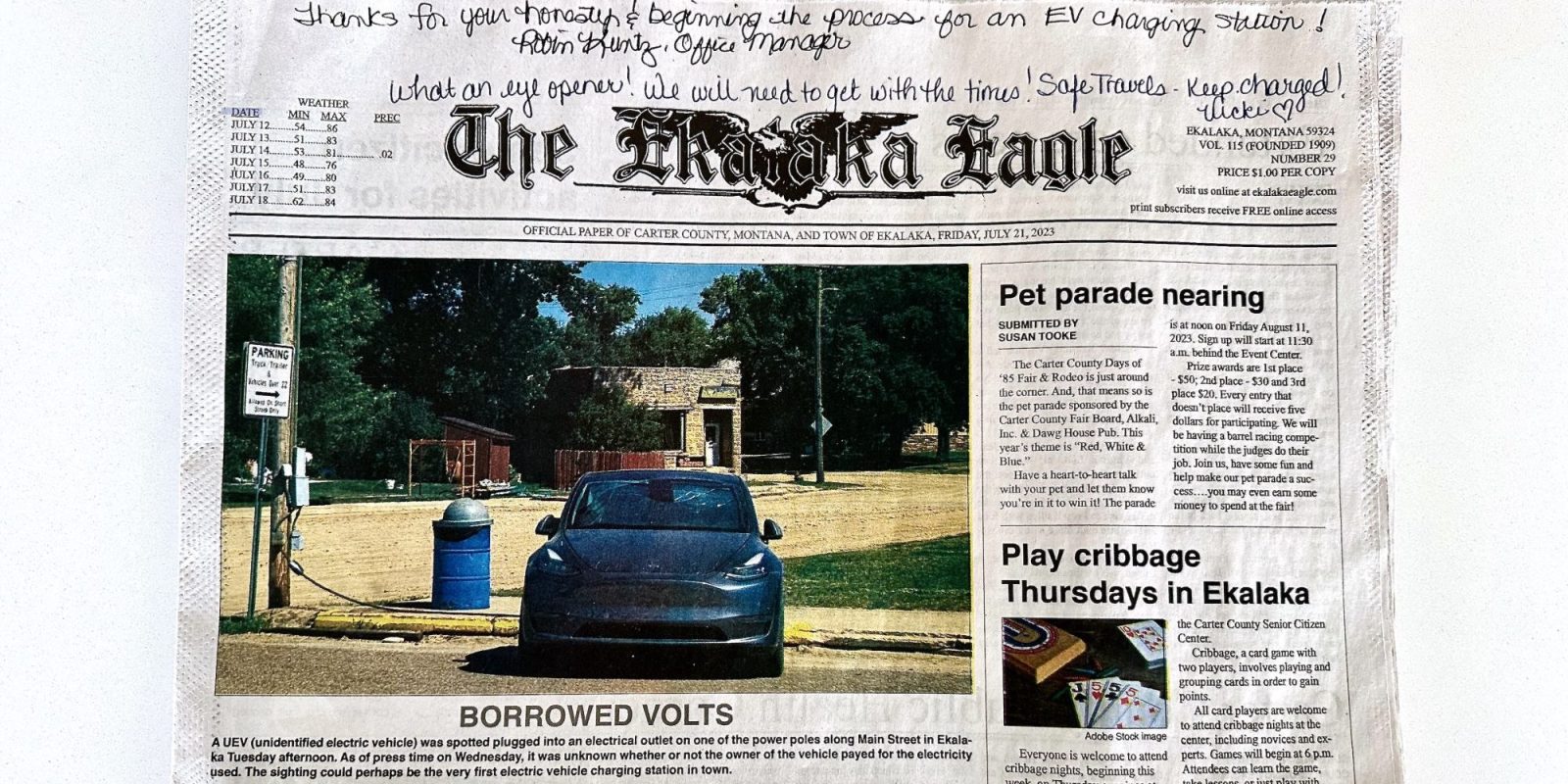An “Unidentified Electric Vehicle” (UEV) made front-page news in a small town paper in Montana when it charged from a public outlet on Main Street.
EV charging has gotten pretty easy these days, even when driving through less-populated areas.
But those of us who have been driving EVs for a long time, or who have driven them in places where routes are underdeveloped, remember having to bum charges in strange places from time to time.
Well, that happened to a couple, Chad Lauterbach and Allis Markham, as they stopped to grab some electrons from a public outlet in the town of Ekalaka, Montana, population 404. The, uh, “drama” was reported by the local paper, the Ekalaka Eagle, and then picked up by the Montana Free Press.
On the very front page, right beside stories about the upcoming pet parade and weekly cribbage meetup at the senior center, a large photo of a Tesla Model Y plugged into a public outlet appears with the caption “BORROWED VOLTS.” The caption refers to the Model Y as a “UEV (unidentified electric vehicle)” and states that this may be the first electric vehicle charger in town, but also muses about whether the UEV had paid for its illicit gains.
The couple, who are from Los Angeles, were actually in town for several days, volunteering at the annual Dino Shindig at the Carter County Museum. Markham is a museum taxidermist who was working on paleo-recreations for the museum. Montana has a rich paleontological history, with one of the highest concentrations of dinosaur fossils of any state in the US. They drove the Model Y instead of Markham’s ’89 Land Cruiser FJ62, since the latter gets ten miles per gallon.
On the way into town, the Model Y repeatedly warned that there wouldn’t be enough Supercharger availability to continue the trip. These are standard warnings when using Tesla’s in-car navigation, which automatically routes trips through the most convenient Supercharger locations.
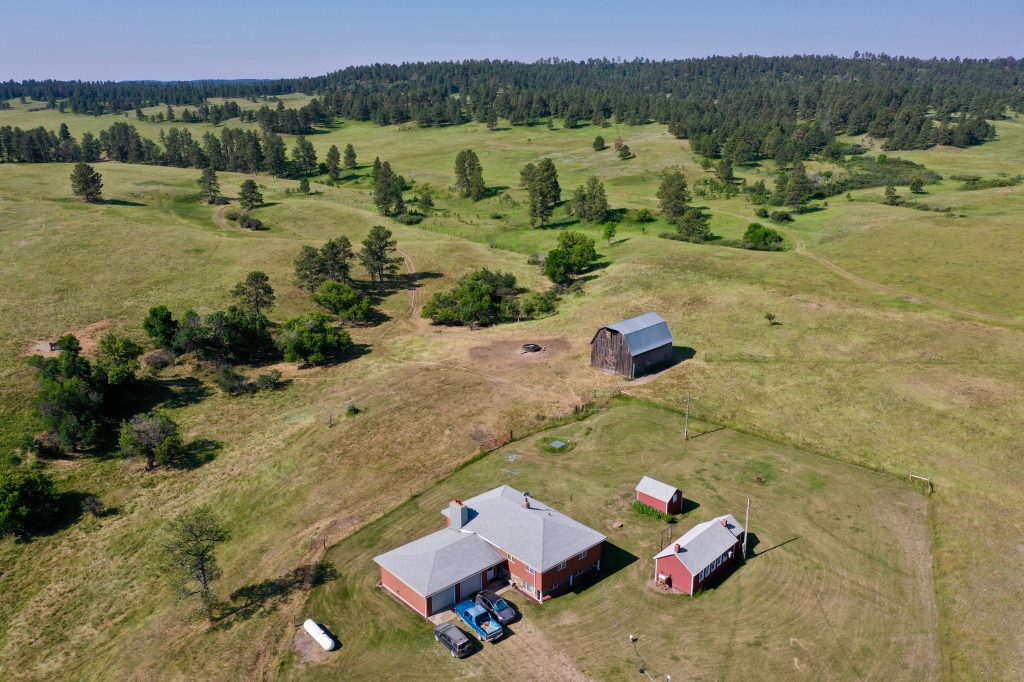
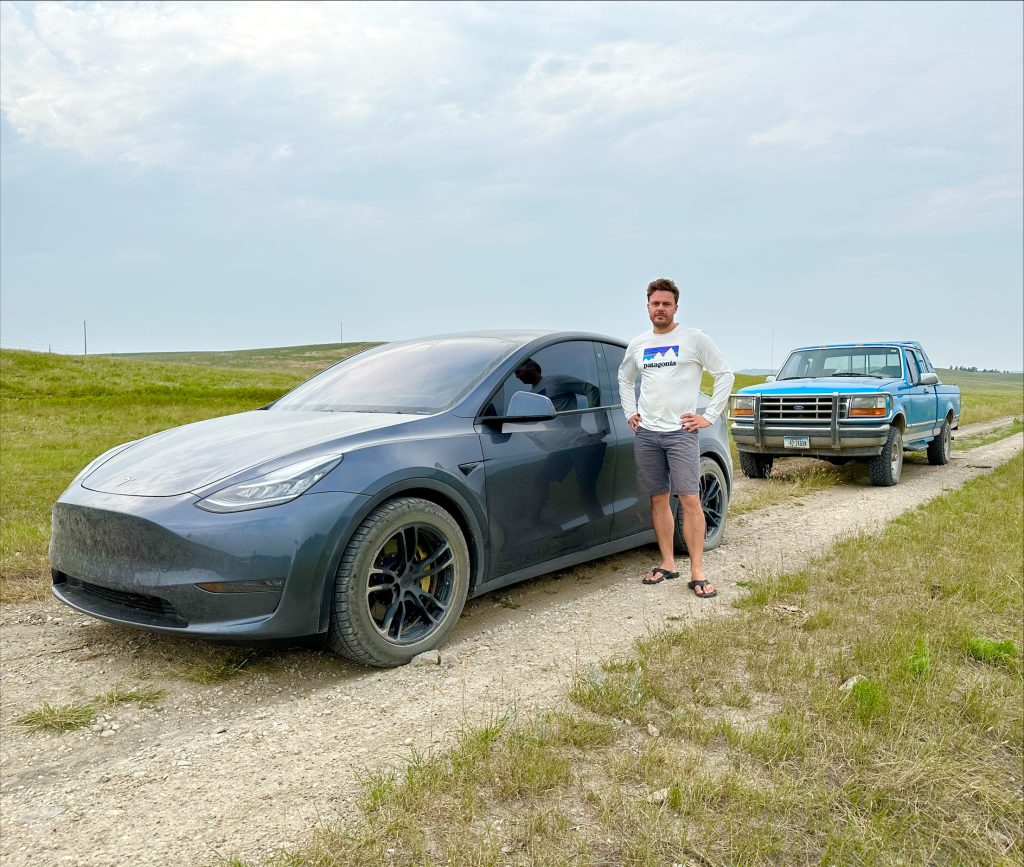
They were staying at a farmhouse 20 miles outside of town, but were charging off a 120V outlet there, which meant a quick trip in and out of town would take a good ten hours or more of charging to compensate. Plus, moving the car along the dirt easement in the pasture that led to the farmhouse proved difficult – not because of the terrain, but because the cows weren’t interested in moving out of the way for a silent car.
But while in town, Lauterbach noticed a spare 14-50 outlet on Main Street, and decided to give it a try. This outlet can deliver electricity about 5-6x faster than a normal US wall outlet, which means a recharge for a 40-mile roundtrip takes closer to one or two hours, instead of ten. And Lauterbach, who owns an IT company and has been driving a Tesla for two and a half years now, travels with a charging adapter kit which is, frankly, kind of overkill (and even includes a level 1 grounding adapter of his own design):
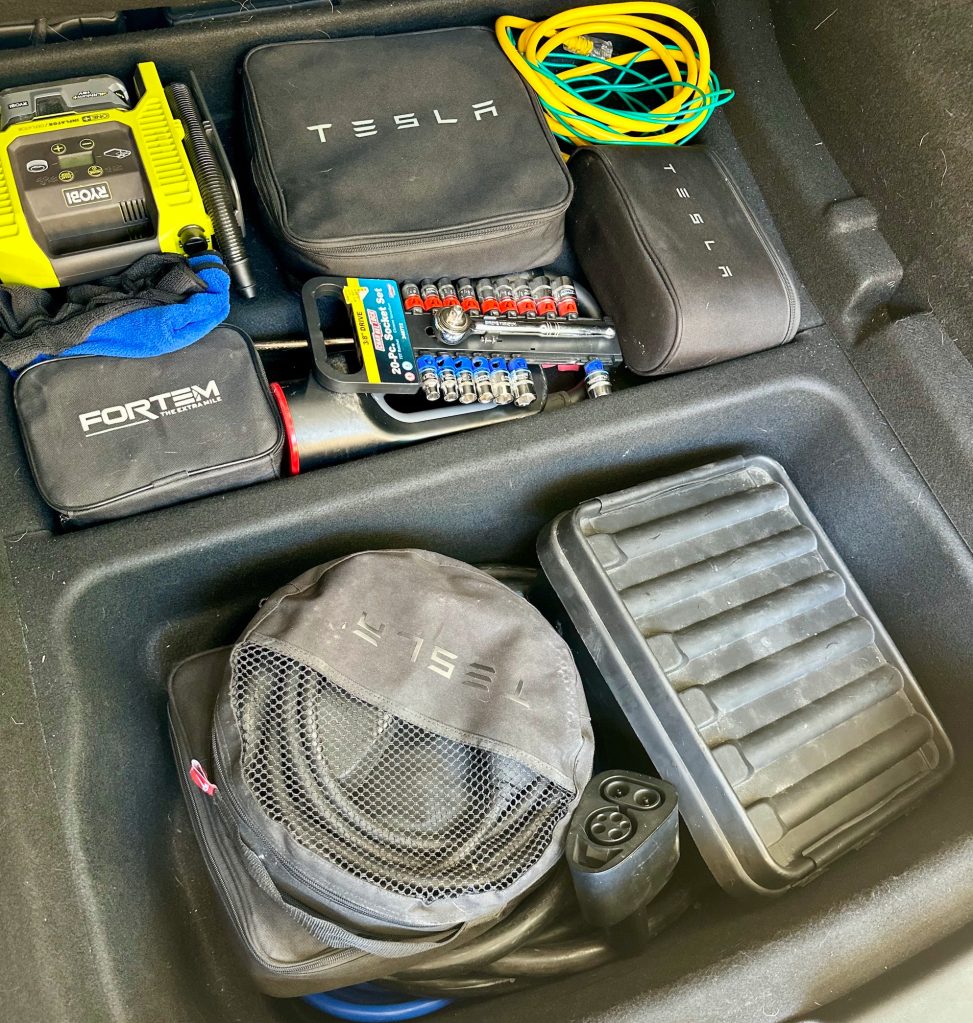
But when Lauterbach wanted to charge on Main Street, Markham warned that the locals might not take kindly to that, and might think that he’s “just some jerk from California, doing what jerks from California do.”
After a successful charge, Lauterbach went back the next day to charge again, but found the outlet had been shut off. A local in a Subaru noticed him and said he might want to check out the local paper, so he went across the street to find himself on the front page, being accused of the crime of electricity theft (he bought three copies).
Markham, feeling vindicated for her prophetic warning, walked over to the Southeast Electric Cooperative headquarters just a block away, and said she was “here to pay for the crimes of the UEV.” After everyone had a good laugh, the couple insisted on paying $60 for a few days of electricity use. They even got a receipt for it, which SECO said was their first-ever EV charging receipt:
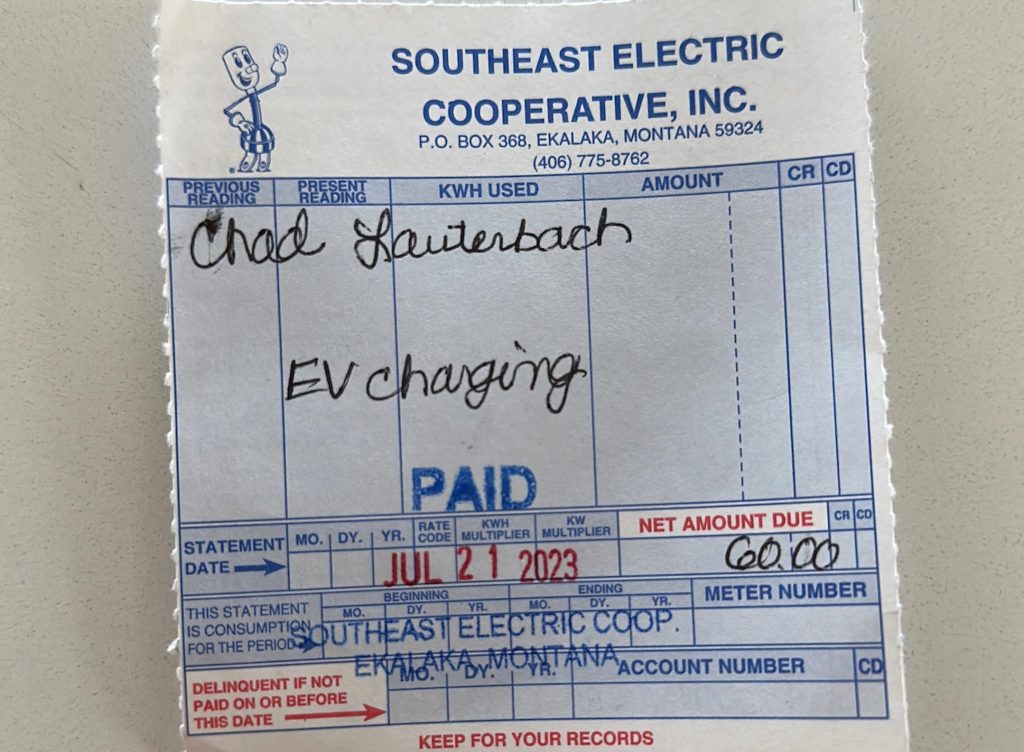
It turns out that the outlet hadn’t been shut off as a response to Lauterbach’s “crimes,” but rather that it is only active a few weekends a year, typically used to help power events held on Main Street. So the couple said that their $60 could help pay for the electricity used to run the music at that weekend’s dinosaur festival dance.
After the encounter, SECO’s staff signed Lauterbach’s copy of the Ekalaka Eagle, seen in this article’s featured photo above. Staff said “we will need to get with the times!” and is now considering installing an electric car charger in town.
At Montana’s average 12c/kWh electricity prices, $60 is enough for about 1,700 miles of driving, using Tesla’s optimistic estimates. A single, 0-100% charge of a Model Y battery would cost about eight dollars at this rate. Lauterbach said the 3,000-mile trip from LA to Montana and back cost about $300 total in charging fees.
Electrek’s Take
When I saw this story, I loved it… because I’ve done something similar myself, and remember stories like these from the early days of EV ownership.
Early on in my EV journey, back in 2011, my dad and I took our Mini E up to Laguna Seca for Refuel Races, an EV track day. We had ours in a car trailer, but fellow Mini E driver Matt Walton followed behind us and drafted the trailer to help with range on the drive up. Then, at the motel, I wanted to make sure the Mini was topped off before the track day, and we found a spare outlet at the bottom of a light post, and got a little extra juice there.
Another Mini E owner once used an outlet next to a vending machine in front of a grocery store to get an extra couple miles on the way home.
This actually highlights one of the things that I like to point out about EVs. Even in a town with no EV charger and no EVs, Lauterbach was able to find a place to charge.
The fact is, electricity is everywhere, even in the absence of official “charging stations.” You’re always closer to a place that you can charge an electric car than you are to a place where you can fill up a gas car – because even gas stations run on electricity.
With a little preparation, it’s easy to tap into this electricity and find a place to fill up, pretty much no matter where you are in the world. Though Lauterbach’s preparation goes above and beyond – the list of 11 different adapter kits he told us he carries would make this article too long if we posted it here.

Gas car owners might occasionally worry about the cost of this (to the public, to the friends or family you’re staying with, etc.), but that’s because the high price of gasoline (which still isn’t high enough given the cost of pollution) is all they have to compare against.
Since EV charging is so much cheaper than gas, most won’t particularly mind once you show them the cost of charging from a standard wall outlet is maybe 20 cents an hour. Give them a bottle of cheap wine to compensate and everything will be okay. Or, as Lauterbach and Markham did, clean up some dinosaur bones, pay for the entertainment, and offer a few test rides to the locals to smooth things over.
